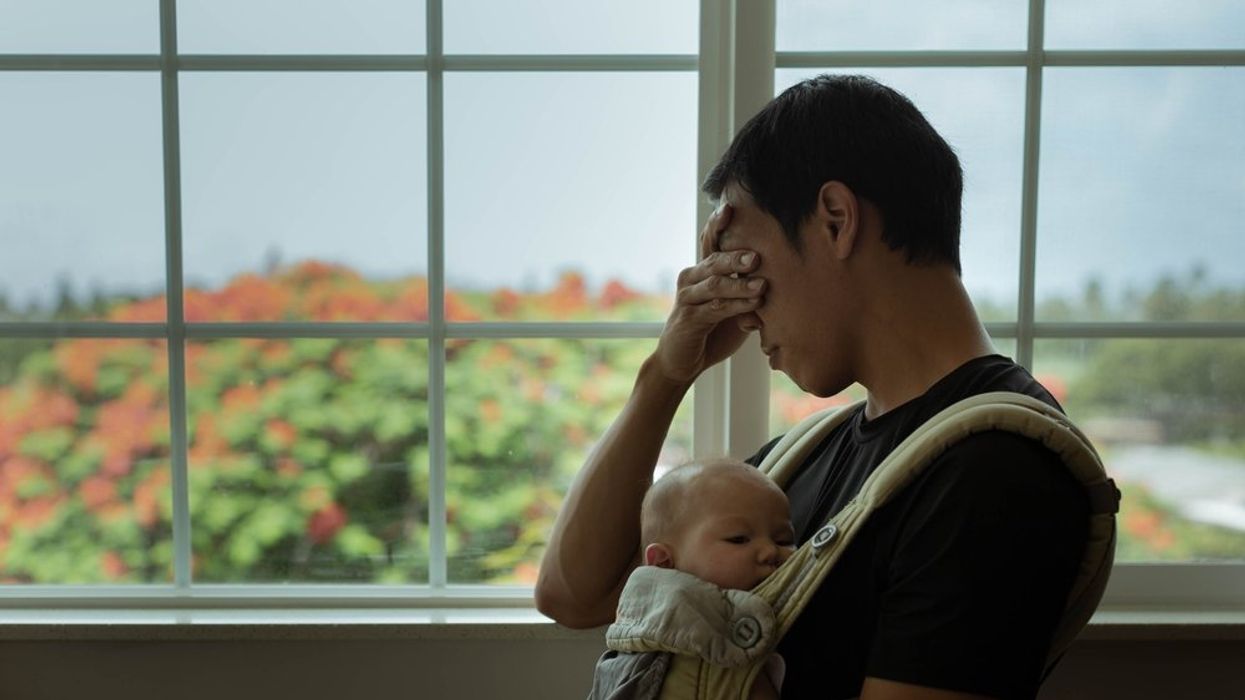Editor's note: Editor’s note:Elena Sheppard is a culture writer who focuses on books, fashion, theater and history. Her first book, “The Eternal Forest: A Memoir of the Cuban Diaspora,” is forthcoming from St. Martin’s Press. The views expressed here are her own. View more opinion on CNN.
(CNN) — After giving birth to my twins, while still recovering in the hospital, I was given a survey. Mixed among the paperwork to fill out about my boys was a sheet to fill out about me: the Edinburgh Postnatal Depression Scale, a commonly used tool to screen for perinatal depression.
I filled out the form — responding to prompts such as, “I have been so unhappy that I have had difficulty sleeping” and was relieved when I could tick the box for “No, not at all” instead of “Yes, most of the time.” For the next six months, at every pediatrician appointment for my sons and postpartum appointment for me, I was given the same survey to complete — postpartum depression is possible up until a year after giving birth.
My husband who, yes, was never pregnant but did also have a wallop of new and existential responsibility heaped into his life with the arrival of our sons, was never asked at any of our appointments about his mental state — and he absolutely should have been. Many doctors already understand that the mental health of the parents is an important factor in the health of the baby — hence why I was screened by our sons’ pediatrician as well as by my own physician.
All new parents should be screened for depression because the health of the entire family depends upon it.
Postpartum depression affects 1 in 7 postpartum women. It can be severe and debilitating, limiting a woman’s ability to care for her child and for herself. It is encouraged, but not mandatory, for doctors to screen postpartum women for depression — less than 50% of new mothers in the United States routinely are. If women are suffering from postpartum depression, there is highly effective treatment available, but before treatment is possible it’s essential for a diagnosis to be made.
It’s estimated that half the postpartum women suffering with their mental health don’t get treatment, and mental health conditions are a leading cause of maternal mortality in the US. Screening for postpartum depression is one small thing we can do to help new moms.
When it comes to dads, postpartum depression in men is far less discussed — and that urgently needs to change. Research indicates that paternal postpartum depression affects as many as 8% to 10% of new fathers.
Risk factors can include disrupted sleep schedules, the hormone changes that men undergo after welcoming a new child, not to mention the life changes and financial, emotional and social stresses a new baby brings. Of course, there are biological considerations as well, and men are more vulnerable if they have a history of depression (the same is true of women). The truth is that paternal postpartum depression is common — but I had never heard of it until my husband was affected.
For the first few weeks of our twins’ lives, my husband was exactly the parent I knew he would be: loving, gentle, kind. And then suddenly he was not. He was distracted, forgetful, distant, quick to anger. I chalked it up to exhaustion until I just couldn’t anymore.
He began to have fears and thoughts that made no sense: The babies were conspiring against him; he confessed he would look at them and feel nothing. He lost all reason when they cried and would shut down, unable to help. With two newborns, I did not have the bandwidth to help him myself, and instead I took on his share of the childcare load. It was stressful and painful for both of us, and I’m sure our children felt it, too.
“For a long time, we believed postpartum depression was hormonally related only. Now we know that hormones are a part of it, but there are a host of other variables that contribute to it,” Karen Kleiman, founder and executive director of the Postpartum Stress Center, told me. The center has been working with perinatal patients since 1988. Added Kleiman: “We know that adoptive mothers get postpartum depression, and now we know that men who do not give birth can also experience full-blown clinical depression.”
I still feel lucky that my husband was in therapy already at the time that he became a dad, and that his therapist quickly diagnosed what was wrong and was able to provide the medical help he needed. I don’t know what would have happened had he not already been in treatment, or how long he would have suffered and therefore we as a family would have suffered. Within weeks of starting medication and continuing with therapy, he was himself again. The problem had been clinical and treatable, but diagnosis was essential.
A recent study among a small sample of new fathers concluded that screening men for postpartum depression would have significant benefits for both men and their families. The study also found that men may be more resistant to mental health services, but that receiving them if needed can make the entire family far happier and healthier.
Sixteen studies between 2002 and 2021 highlighted the importance of treating paternal depression, indicating that a family-focused approach to treatment is critical.
Historically, maternal depression was considered primary for child outcomes, but these studies show the impact of a father’s mental health on the child, too. A father’s untreated depression can put a child’s mental health at risk.
After my husband was diagnosed, we tried to be open about our experience, but many people I told rolled their eyes or laughed. I was asked more than once if he was just trying to shirk his parenthood responsibilities or if he even “had the right” to be suffering from postpartum depression — as if he had been given a choice.
Those reactions were upsetting and show just how much needs to be done to destigmatize this issue and help the many people suffering from it. “They’re being ignored by the medical community,” Kleiman said of new dads who experience mental health struggles, particularly noting the many who enter parenthood already with untreated depression. “Both parents should be screened after the birth of the baby,” she insisted.
In 2022, the year my sons were born, the US Centers for Disease Control and Prevention recorded 3,661,220 were born in the United States. To do some crude math, if 10% of new fathers experience postpartum depression that would amount to 366,122 men. That is a shocking number of people to be potentially affected by something that is not being screened for or that, worse, is far too often considered to be an excuse, a cop-out or even a joke.
We do so little for new parents in this country: Screening every new parent for postpartum depression — regardless of who gave birth — is one small step we can take to help families to be the healthiest versions of themselves.
Written by Elena Sheppard
The-CNN-Wire
™ & © 2023 Cable News Network, Inc., a Warner Bros. Discovery Company. All rights reserved.
Inequality in Maternal Mortality

Video Source: Advocate Channel

















































